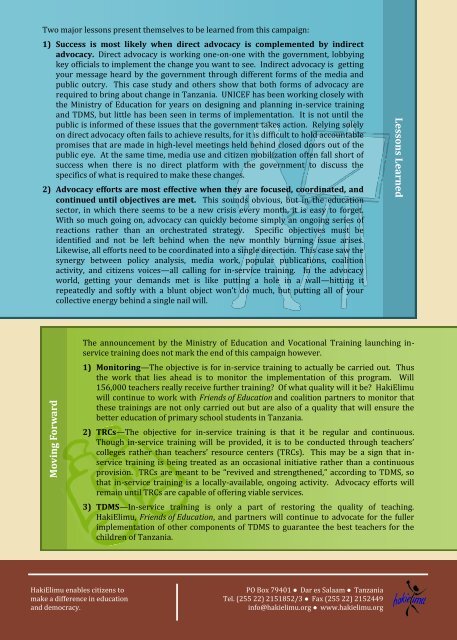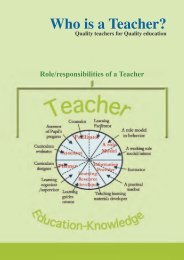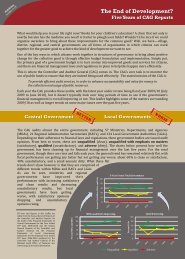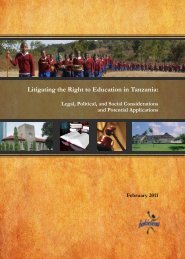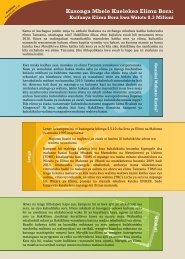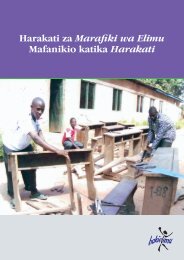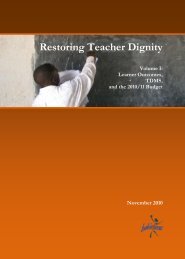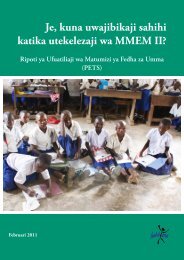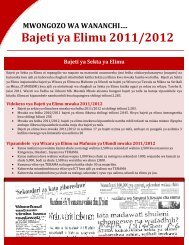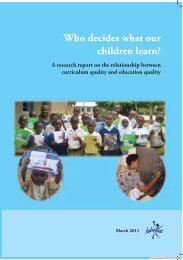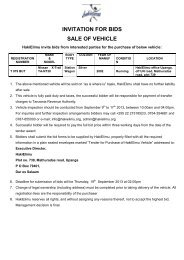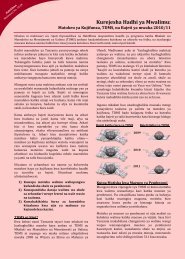The Campaign for In-Service Training: - HakiElimu
The Campaign for In-Service Training: - HakiElimu
The Campaign for In-Service Training: - HakiElimu
You also want an ePaper? Increase the reach of your titles
YUMPU automatically turns print PDFs into web optimized ePapers that Google loves.
Moving Forward<br />
Lessons Learned<br />
Two major lessons present themselves to be learned from this campaign:<br />
1) Success is most likely when direct advocacy is complemented by indirect<br />
advocacy. Direct advocacy is working one-on-one with the government, lobbying<br />
key officials to implement the change you want to see. <strong>In</strong>direct advocacy is getting<br />
your message heard by the government through different <strong>for</strong>ms of the media and<br />
public outcry. This case study and others show that both <strong>for</strong>ms of advocacy are<br />
required to bring about change in Tanzania. UNICEF has been working closely with<br />
the Ministry of Education <strong>for</strong> years on designing and planning in-service training<br />
and TDMS, but little has been seen in terms of implementation. It is not until the<br />
public is in<strong>for</strong>med of these issues that the government takes action. Relying solely<br />
on direct advocacy often fails to achieve results, <strong>for</strong> it is difficult to hold accountable<br />
promises that are made in high-level meetings held behind closed doors out of the<br />
public eye. At the same time, media use and citizen mobilization often fall short of<br />
success when there is no direct plat<strong>for</strong>m with the government to discuss the<br />
specifics of what is required to make these changes.<br />
2) Advocacy ef<strong>for</strong>ts are most effective when they are focused, coordinated, and<br />
continued until objectives are met. This sounds obvious, but in the education<br />
sector, in which there seems to be a new crisis every month, it is easy to <strong>for</strong>get.<br />
With so much going on, advocacy can quickly become simply an ongoing series of<br />
reactions rather than an orchestrated strategy. Specific objectives must be<br />
identified and not be left behind when the new monthly burning issue arises.<br />
Likewise, all ef<strong>for</strong>ts need to be coordinated into a single direction. This case saw the<br />
synergy between policy analysis, media work, popular publications, coalition<br />
activity, and citizens voices—all calling <strong>for</strong> in-service training. <strong>In</strong> the advocacy<br />
world, getting your demands met is like putting a hole in a wall—hitting it<br />
repeatedly and softly with a blunt object won’t do much, but putting all of your<br />
collective energy behind a single nail will.<br />
<strong>The</strong> announcement by the Ministry of Education and Vocational <strong>Training</strong> launching inservice<br />
training does not mark the end of this campaign however.<br />
1) Monitoring—<strong>The</strong> objective is <strong>for</strong> in-service training to actually be carried out. Thus<br />
the work that lies ahead is to monitor the implementation of this program. Will<br />
156,000 teachers really receive further training? Of what quality will it be? <strong>HakiElimu</strong><br />
will continue to work with Friends of Education and coalition partners to monitor that<br />
these trainings are not only carried out but are also of a quality that will ensure the<br />
better education of primary school students in Tanzania.<br />
2) TRCs—<strong>The</strong> objective <strong>for</strong> in-service training is that it be regular and continuous.<br />
Though in-service training will be provided, it is to be conducted through teachers’<br />
colleges rather than teachers’ resource centers (TRCs). This may be a sign that inservice<br />
training is being treated as an occasional initiative rather than a continuous<br />
provision. TRCs are meant to be “revived and strengthened,” according to TDMS, so<br />
that in-service training is a locally-available, ongoing activity. Advocacy ef<strong>for</strong>ts will<br />
remain until TRCs are capable of offering viable services.<br />
3) TDMS—<strong>In</strong>-service training is only a part of restoring the quality of teaching.<br />
<strong>HakiElimu</strong>, Friends of Education, and partners will continue to advocate <strong>for</strong> the fuller<br />
implementation of other components of TDMS to guarantee the best teachers <strong>for</strong> the<br />
children of Tanzania.<br />
<strong>HakiElimu</strong> enables citizens to<br />
make a difference in education<br />
and democracy.<br />
PO Box 79401 ● Dar es Salaam ● Tanzania<br />
Tel. (255 22) 2151852/3 ● Fax (255 22) 2152449<br />
info@hakielimu.org ● www.hakielimu.org


